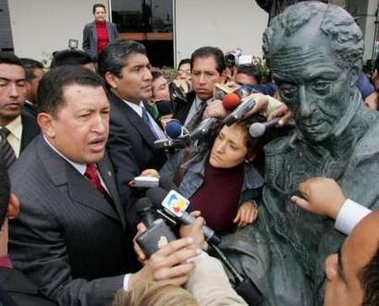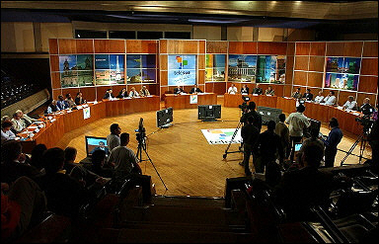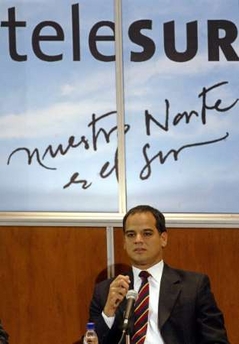Untitled Document
A new Latin American Television station spearheaded by Venezuelan President
Hugo Chavez is designed to counter the influence of the North American media
so that, 'the light of truth might slip through and break the grip of corporate
television.' The Bush Administration and U.S. Congress are not amused.
The attempts of the Bush government and the Colombian oligarchy to discredit
Telesur [a new pan-Latin American TV channel based in Venezuela] before it officially
begins its transmissions, shows that the project in on the right track and that
the empire [the United States] wants to close this window that will show Latin
Americans a reality that they have never seen with the "objectivity"
of CNN.
 |
Hugo Chavez speaks next to a statue of Simon
Bolivar, the South American Liberator, in Lima, Peru. |
President Hugo Chavez, in telephone call to a Venezuelan State TV program less
than two days ago, analyzed the decision by the U.S. Congress to beam programming
to counter the transmissions of Telesur into Venezuela. On the matter he said:
"The imperialist giant is entering a dangerous stage of desperation, and
there is nothing more dangerous that a desperate giant. Everyone is witness
to the efforts that have been made by the imperialistic government of the United
States to isolate the Venezuelan government. But nevertheless, the results have
been just the opposite, and this has worked like something of a boomerang. In
the last few months our proposals have advanced much more than at any other
time."
Some of the "advances" referred to are the agreements signed with
the governments of Brazil and Argentina, in the case of Petrosur [a joint oil
company amongst the three countries], PetroCaribe [an energy-security cooperative]
with 13 heads of State in the Caribbean and the approval of a document that
will create PetroAndina [similar to PetroCaribe], endorsed within the framework
of the 16th Summit of the Andean Community.
Remember that Telesur is a project that transcends the Venezuelan border and
which proposes that ideas that go out over the air waves have complete freedom
of expression: "I hope critics of my government see that I am the greatest
critic of my own actions," said Chavez.
 |
Telesur's First Broadcast
on Sunday |
U.S. SIGNALS AND ELECTRONIC WAR
The Bush government seems to have gone into a panic when Telesur announced
that correspondents in several U.S. cities would let us see what they have up
to now denied us, that the "American dream" has turned into a nightmare
and that the light of truth might slip through and break the grip of corporate
television ... and that will once and for all disprove "Mr. Danger's"
unremitting accusations against the administration of President Chavez. ["Mr.
Danger" is a reference to President Bush].
For that reason, the proposal made by American senators is no surprise to anyone.
And for that reason Chavez's answer was concrete, precise and proper: "The
time to be withdrawn and silent is in the past. We used to fall back and turn
the other cheek, as Christ said. But after the coup d'état in April of
2002, both of our cheeks turned purple."
[Editor's Note: Actually, it was a member of the House of Representatives,
not the Senate, that introduced a bill authorizing the U.S. government, "to
initiate radio and television broadcasts that will provide a consistently accurate,
objective, and comprehensive source of news to Venezuela." The lawmaker
that introduced the bill was Florida Congressman Connie Mack].
"If the U.S. government dares to take any action, whatever it may be -
for example, if it issues very powerful [TV] signals - well, then, there will
be electronic warfare," declared President Chavez, and he recalled that,
"If Fidel Castro has been able to neutralize the signal of Radio Martí,
than we will also neutralize any signal."
IMPACT
But beyond the attempts to scuttle the launch of Telesur, the people of South
America have expressed their hope that the TV project will try to change how
we see ourselves.
Sergio Arelovich, Professor of Political Economy at the National University
of Rosario, Argentina, in a letter sent to this reporter, indicates "this
birth (that of Telesur) has a significance that cannot as yet be determined."
Reflecting on the issue of the media on our continent, Professor Arelovich
points out in his letter that "the major media try to homogenize the heterogeneous,
artificially erasing differences. This is a problem and inhibits the full expression
of multicultural richness.
 |
Andres Izarra, president of
Telesur |
In his touching but analytical letter, Arelovich says: "If we wanted to
make a partial list of guiding principles, it would say (that Telesur must):
INFORM even if news is unwelcome; COUNTERINFORM in the face of the discourse
of empire; It should have its OWN AGENDA and not one that the mass media seeks
to impose; It should create a space that is accessible to the COMMUNITY; and
it should not limit itself to the consumption of information from outside, but
include information from within civil society."
In a happy coincidence for Latin America, someone whose thoughts are in synchrony
with Arelovich is Minister of Communication and Information and President of Telesur,
Andrés Izarra, who pointed out that the channel is "a powerful tool
for integration ... more than a simple television channel. I believe that it is
indeed a step, a way, a freeway, by which we are going to make Unasur a reality,
the Union of Nations of the South."
[Editor's Note: Izzara resigned his post as minister of communication and information
on Tuesday, saying that he wanted to assure that Telesur would not suffer from
charges of a conflict of interest. The Venezuelan government has a 51% share
in Telesur, with Cuba, Argentina, and Uruguay making up the other 49%].
From Venezuela's perspective, Telesur represents a scenario, a danger to the
enemies of integration and for those that want to divide and dominate us.
BIRTH UNDER FIRE
Jose Vicente Rangel, the vice president of the Bolivarian Republic of Venezuela,
characterized the measures adopted by the American Congress to resist Telesur
as "a great victory."
When doing an analysis of the imperial mechanisms, he said, "At bottom
is the application of the same format that has been applied to Cuba for 50 years
without result. It is the same experience as Radio Martí in Cuba."
The Venezuelan vice-president sees no problem in that, "as there is a
Telesur, there can be a TeleBush, this means nothing in particular."
In summary, Telesur represents the chance to see what they have hidden from
us, for example:
-- The United States has 40 million people in poverty
-- 30 million consumers of illegal drugs
-- It is a country with the world's largest fiscal deficit
-- It maintains a center of torture in Guantanamo
-- It does not obey international law
-- It jails journalists for not revealing their sources
Who in their right mind thinks that Bush would tell these things to the world?
Even with this situation, TELESUR is a reality and will be a channel that will
represent us like the sun setting in the Americas, like the spirit of our Liberators,
like what we have always been, and what they wish to not to acknowledge.
[Editor's Note: "The Liberators" is most likely a reference to Simon
Bolivar and and those that accompanied him during his war against the Spanish
in Latin America two hundred years ago. This is probably a metaphor for "small"
independent countries standing against the percieved imperialism of the United
States. Those the author refers to at the end of the last paragraph as not wishing
to acknowledge Latin America - again - is likely a reference to the United States,
regarded by many Latin Americans as heavy-handed, regarding the region as its
"backyard"].

